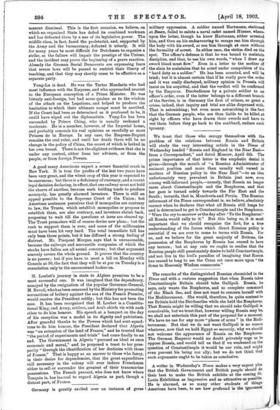Germany is greatly excited over an instance of gross
military oppression. A soldier named Hartmann, stationed at Essen, failed to salute a naval cadet named Hiisner, where. upon the latter, though he knew Hartmann, either arrested him, and then on his endeavouring to escape ran him through the body with his sword, or ran him through at once without the formality of arrest. In either case, the victim died on the spot. The officer's defence is that he was bound to maintain discipline, and that, to use his own words, "when I draw my sword blood must flow." Even in a letter to the mother of the slain he maintains that he acted under compulsion of his "hard duty as a soldier." He has been arrested, and will be tried; but it is almost certain that if he really gave the order and it was really disobeyed, military opinion in Prussia will insist on his acquittal, and that the verdict will be confirmed by the Emperor. Disobedience by a private soldier to an officer's order, even if the latter belongs to a different branch of the Service, is in Germany the first of crimes, so great a crime, indeed, that inquiry and trial are alike dispensed with. That is astonishing; but even more astonishing is the fact that the German people, who are thus liable to be killed at sight by officers who have drawn their swords and have to wet them before they go back to the scabbard, endure such tyranny.






































 Previous page
Previous page